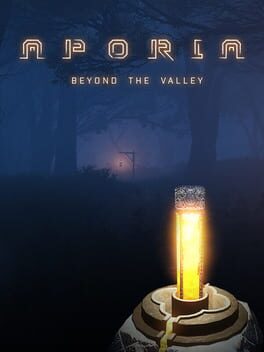

Aporia: Beyond the Valley
released on Jul 19, 2017
Aporia: Beyond The Valley brings a unique approach to the art of storytelling, by not using text or dialogue. It offers new, interesting puzzle mechanics, and elaborate environmental storytelling within an immersive world. Aporia: Beyond The Valley is a first-person puzzle game set in the world of Ez’rat Qin. Explore a world filled with strange nature, ancient technology, and haunted by a spirit roaming the fog-covered forest. With a whole new story and puzzle mechanics, Aporia: Beyond The Valley presents players with the challenge of actively exploring and piecing together a non-linear story of what happened in this mysterious world.
Reviews View More
Aporia: Beyond the Valley understands three fundamental things about Myst: not everybody picked Myst up for the puzzles(t); to a subset of players, the mystery of why they were on Myst Island was more fascinating than any answer the game could ever hope to give them; Myst was kind of scary. If you could never escape the first island but wanted to keep exploring, Aporia was made for you. That isn't to say that there isn't an emphasis on puzzle solving here—what game inspired by Myst would be replete without that? But the puzzles here are pretty simplistic and, in my experience, only require brainpower due to occasionally lacking feedback. The real draw of Aporia is its atmosphere. While being clearly made on a budget ensures that not every corner of this world looks as pleasant as others (the starting area's artificial-looking water and dreary dark corners belie how breathtaking the second area's lake is), everything from the lighting to the environment design compels you to explore and ask questions the entire time. This focus on atmosphere extends to its slow pace, lack of explicitly stated direction, and lack of spoken dialog. That lack of direction can be a double-edged sword because, while it draws you closer to its mystery, it ensures that any significant breaks taken from playing this is bound to confuse. I find the lack of dialog to be a very fascinating touch, however, as it ensures that this is a story that could only be told and understood through the lens of it being a video game. I don't want to get too pretentious sounding with my praise, but I love it when I see it.
Overall, from what I've played of Aporia, I recommend it. But I can totally see why this is so niche and has flown under so many radars. It's a bit of a bummer that the majority of the people who own this have never played it (only 28% of the people who have played it have found a map, and I'm not bullshitting those numbers). If you're one of the many who bought this with a 75% off coupon at some point or bought it for a dollar through Humble Bundle like I did back then, I recommend checking it out if you're looking for something more deliberate and laconic.
t= wording has been corrected to be more inclusive.
Overall, from what I've played of Aporia, I recommend it. But I can totally see why this is so niche and has flown under so many radars. It's a bit of a bummer that the majority of the people who own this have never played it (only 28% of the people who have played it have found a map, and I'm not bullshitting those numbers). If you're one of the many who bought this with a 75% off coupon at some point or bought it for a dollar through Humble Bundle like I did back then, I recommend checking it out if you're looking for something more deliberate and laconic.
t= wording has been corrected to be more inclusive.
A very solid adventure. While not as remarkable as the truly great ones, this really shows how you can avoid the easy mistakes that make it fun to play - maybe that's remarkable after all.
Visually, it makes use of semi-realistic, dreamy environments but tweaks it to a pleasant overall look (which in contrast to other games, doesn't scream 'I was made with UE4 defaults' e.g.). Generally, the variety of visuals is remarkable.
As adventures should, it has a variety of different puzzles that also interact with the environment, which is great. Even better, it fits the overall theme of the surroundings and never feels repetitive.
The story portions are not the strongest part, which is expected of games that do not want to have narratives pushed through written or voiced means and instead opt for the more classic way of people communicating with neatly drawn images depicting the story.
Overall, a pleasant surprise and an actually rare example of a good adventure that's mainly based on puzzles.
Visually, it makes use of semi-realistic, dreamy environments but tweaks it to a pleasant overall look (which in contrast to other games, doesn't scream 'I was made with UE4 defaults' e.g.). Generally, the variety of visuals is remarkable.
As adventures should, it has a variety of different puzzles that also interact with the environment, which is great. Even better, it fits the overall theme of the surroundings and never feels repetitive.
The story portions are not the strongest part, which is expected of games that do not want to have narratives pushed through written or voiced means and instead opt for the more classic way of people communicating with neatly drawn images depicting the story.
Overall, a pleasant surprise and an actually rare example of a good adventure that's mainly based on puzzles.
